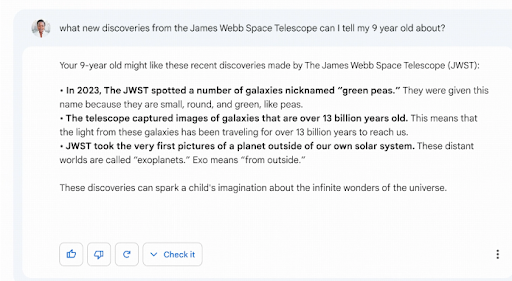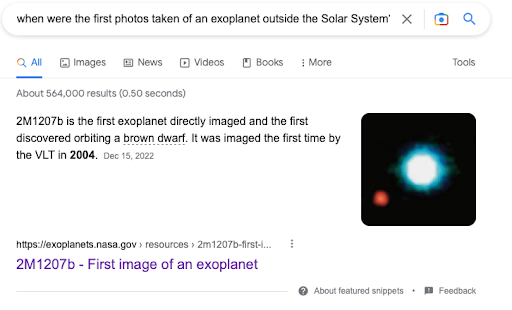Google’s longstanding uncontested dominance of the search market faces its first serious challenge, as Microsoft unveiled an AI-powered chatbot with the potential to make conventional Internet search obsolete.
Instead of typing search terms into a box and getting links to websites that might contain the answer you seek (or might not), the new version of Bing will — potentially — let you just type a question and get the answer, all in a few paragraphs of natural language.
My Silverlinings colleague Steven Vaughan-Nichols has the details of the Microsoft news, unveiled at a surprise in-person news conference Tuesday.
This week, Google got ready to march to battle with the Microsoft challenger. Google laced up its clown shoes and, immediately stepped on a rake and smacked itself in the face.
In a blog post Monday, followed by a news conference from Paris Wednesday, Google parent Alphabet unveiled its own chatbot, called Bard. The blog post included an embedded GIF, demonstrating how the chatbot works. Here’s a screenshot of the demo—which also went out on social media from Google, and in advertising.

Looks great, right? The problem is the third answer is wrong. Here’s the correct answer:

I discovered the right answer by using Google’s existing search engine. So Bard looks like a step backward for Google.
Back to school, Bard
Alphabet stock closed down 8% Wednesday. Microsoft was also down, nearly 1% — not as much as Alphabet.
A Google spokesperson told Reuters that the Bard faux pas “highlights the importance of a rigorous testing process, something that we’re kicking off this week with our Trusted Tester program… We’ll combine external feedback with our own internal testing to make sure Bard’s responses meet a high bar for quality, safety and groundedness in real-world information."
Nice try, Google spokesperson.
The Google technology is based on the company’s Language Model for Dialogue Applications (LaMDA), unveiled two years ago. In its Monday blog, Google describes the technology as “experimental” (I’ll say!) The chatbot uses a “lightweight” LaMDA version requiring less computing power and providing greater scalability, Google says. ( “Lightweight” is a much nicer way of saying “stupid.”)
The LaMDA interface is designed to provide responses to “No One Right Answer” queries—intelligent opinions and judgment calls, as opposed to cold facts. In its blog, Google cites the example of asking whether it’s easier to learn guitar or piano.
As for the new Bing: It’s based on the same OpenAI technology underlying ChatGPT, introduced in November. Microsoft is backing OpenAI for about $10 billion.
The new Bing is available today. Alphabet says Bard will be out in a few weeks.
At its event Wednesday, Google also unveiled enhancements to Maps, Translate, and visual search.
Google's stakes ... not steak (mmm, steak)
The stakes are high for Google, which enjoys 84% of the search market, compared with Bing, which clocks in at under 9%. Google has dominated the search market without challenger since its launch in 1998. Microsoft launched its first search engine, which later became Bing, at about the same time.
Bing has never been a challenger to Google—until, possibly, now. After punching ineffectually at Google for 25 years, Microsoft has finally landed a hit.
“Tenacity is arguably the defining cultural principle at Microsoft,” writes tech blogger John Gruber at Daring Fireball. “If they want to do something, they simply do not give up.”
Gruber also says: “… you’d be a fool to count Google out in this race. But shipping talks and bullshit walks. Microsoft is opening up the new Bing to real people now. Not so with Bard.”
Gruber is right on all of it — including that it’s wrong to count Google out.
Microsoft scored a nice win this week. But Google has vast resources, some of the smartest computer scientists in the world, and a lot riding on maintaining its search engine lead. “Search and other” revenue accounted for 56% of the money Alphabet took in in the quarter ending Dec. 31, with revenue in that category declining year-over-year.
On the other hand, if Microsoft can challenge Google by redefining the search category, it’ll be a case of history repeating itself, with Microsoft cast as the winner this time. Microsoft monopolized the client computing market in the 1990s, with its desktop Windows and Office software, but saw that monopoly fade as smartphones eclipsed PCs in importance, including phones running Google’s Android operating system.
As for now, Google’s dominance of the search market is still complete.
And I did much of the research for this article using Google. Not Bing.
